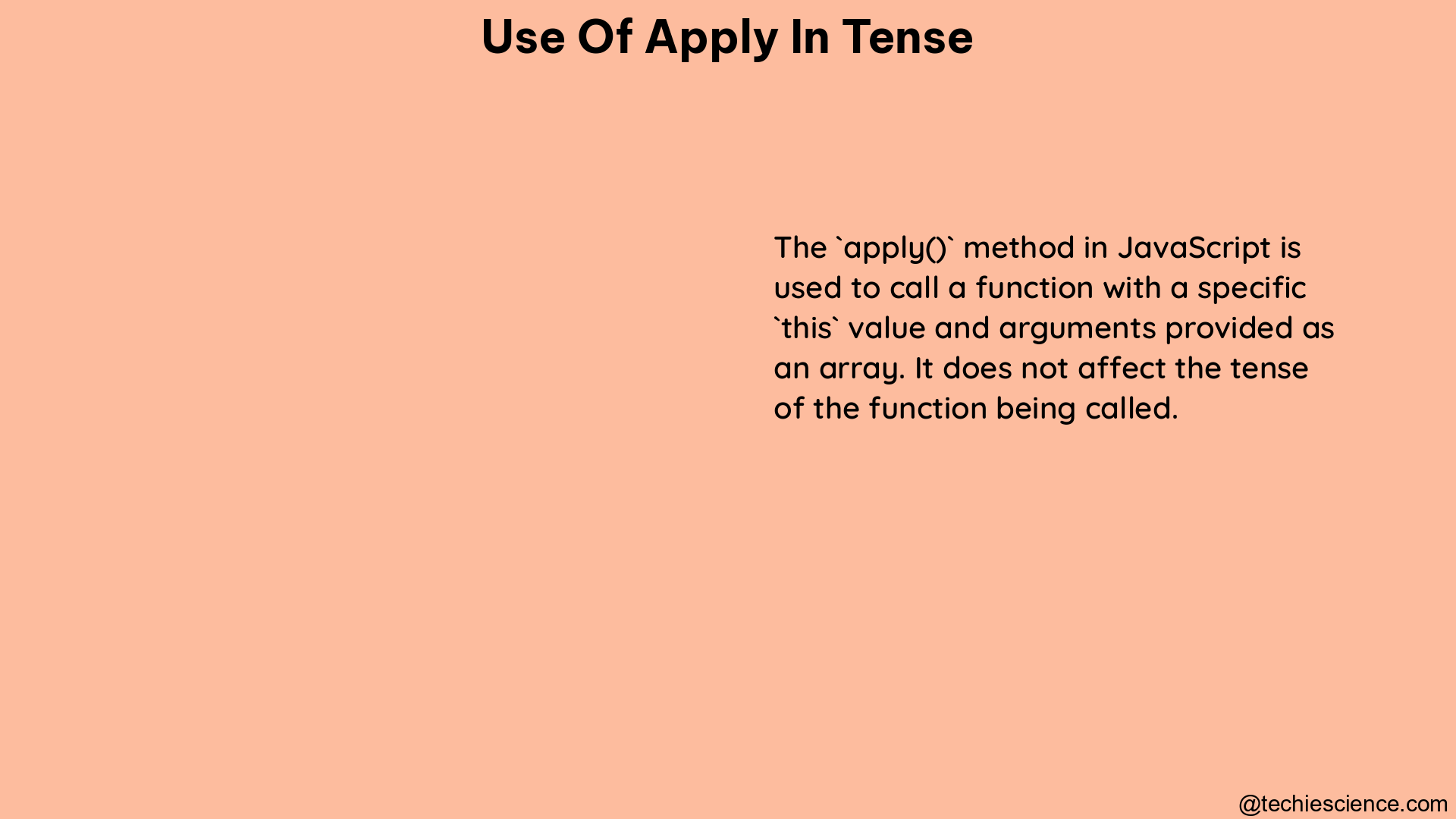The use of the verb “apply” in English can be quite nuanced, with various grammatical specifications and tense variations. This comprehensive guide will delve into the intricacies of using “apply” in different tenses, providing you with a thorough understanding of its proper usage.
Present Tense
Base Form
The base form of the verb “apply” is used to express general truths, habitual actions, or scheduled events in the near future.
Examples:
– I apply for the job every time a new position opens up.
– The company applies strict safety protocols in the workplace.
– They apply the latest technology to their manufacturing process.
Third Person Singular
When the subject is a singular third-person noun or pronoun, the verb “apply” takes the “-s” ending.
Examples:
– She applies for multiple scholarships each year.
– The policy applies to all employees in the organization.
– The rule applies to anyone who wants to use the facility.
Past Tense

Past Simple
The past simple form of “apply” is used to describe actions that occurred in the past.
Examples:
– I applied for the position last month and was selected for an interview.
– They applied a fresh coat of paint to the walls yesterday.
– The team applied their problem-solving skills to find a solution.
Past Participle
Form
The past participle of “apply” is “applied,” which is used in perfect tense constructions and passive voice sentences.
Examples:
– The final coat of paint has been applied to the walls.
– The new policies were applied strictly by the management team.
– The techniques learned in the workshop were successfully applied in the project.
Perfect Tenses
Present Perfect
The present perfect tense is formed using the auxiliary verb “have/has” and the past participle “applied.”
Examples:
– I have already applied for the grant and am waiting to hear back.
– She has applied to several universities and is now considering her options.
– They have applied the latest software updates to all the company’s computers.
Past Perfect
The past perfect tense is formed using the auxiliary verb “had” and the past participle “applied.”
Examples:
– By the time I arrived, they had already applied the finishing touches to the project.
– She had applied to multiple internships before finding the perfect one.
– The team had applied their expertise to the problem, but the solution remained elusive.
Future Perfect
The future perfect tense is formed using the auxiliary verb “will have” and the past participle “applied.”
Examples:
– By the end of the year, I will have applied to all the top-ranked universities.
– The company will have applied the new software update to all their systems by the end of the month.
– By the time the deadline arrives, the researchers will have applied their findings to the final report.
Conditional Tenses
Conditional Present
The conditional present tense is formed using the modal verb “would” and the base form of the verb “apply.”
Examples:
– I would apply for the job if I had the necessary qualifications.
– They would apply the new techniques to their work if they received the proper training.
– If the opportunity arose, she would apply for the leadership position.
Conditional Present Progressive
The conditional present progressive tense is formed using the modal verb “would,” the auxiliary verb “be,” and the present participle “applying.”
Examples:
– I would be applying for the position if I had more experience.
– They would be applying the new safety protocols if they had received the updated guidelines.
– If the deadline was extended, she would be applying for the grant.
Conditional Perfect
The conditional perfect tense is formed using the modal verb “would,” the auxiliary verb “have,” and the past participle “applied.”
Examples:
– I would have applied for the scholarship if I had known about it earlier.
– They would have applied the new techniques to the project if they had received the necessary training.
– If the weather had been better, she would have applied for the outdoor position.
Common Mistakes
Incorrect Past Participle
One common mistake is using the base form or past simple form of “apply” with auxiliary verbs instead of the past participle “applied.”
Incorrect: I have apply for the job.
Correct: I have applied for the job.
Incorrect: They was apply the new policies.
Correct: They were applying the new policies.
Misusing the Past Simple
Another mistake is using the past simple form of “apply” in passive voice constructions instead of the past participle.
Incorrect: The new regulations was apply by the management.
Correct: The new regulations were applied by the management.
Prepositions with “Apply”
Apply to
Use “apply to” when taking an action directed towards something or someone.
Examples:
– I am applying to several universities for my graduate studies.
– The new safety guidelines apply to all employees in the company.
– The scholarship program applies to students from low-income families.
Apply in
Use “apply in” when taking an action within a specific place or context.
Examples:
– The research findings can be applied in various industries.
– The principles of effective communication apply in both personal and professional settings.
– The new software updates will be applied in the company’s IT systems.
Pluralistic Form
Singular Noun
When the subject is a singular noun, the verb “apply” takes the plural form “applies.”
Example:
– One limitation applies to the use of this model.
Plural Noun
When the subject is a plural noun, the verb “apply” takes the singular form “apply.”
Example:
– Two limitations apply to the use of this model.
Additional Tips
Bare Infinitive
The bare infinitive form of “apply” (without “to”) is used to express routine or habitual actions, general truths, or scheduled events in the near future.
Examples:
– The company apply strict quality control measures to all their products.
– The rules apply to everyone who uses the facility.
– The new software update apply next week.
Passive Voice
When using the passive voice, the past participle “applied” is used to describe an action performed on the subject.
Examples:
– The final coat of paint was applied to the walls.
– The new policies were applied strictly by the management team.
– The techniques learned in the workshop were successfully applied in the project.
References
- Bab.la – Conjugation of “to apply” in English
- WordReference.com – Conjugation of “apply”
- Stack Exchange – “Applying to” or “applying in”
- Promova – Past tense of “apply”
- Reddit – “Applies” and “apply” and their pluralistic form

Hi…..I’m a graduate with a Bachelor’s degree in English Literature. I wish to do a Masters in the same field someday and continue my career in Academia.
Let’s connect through LinkedIn: